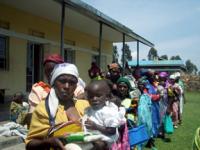Table of Contents
History of DGH In the Community

DGH has been involved in Southwest Uganda since 1999 when it partnered with the Mbarara University of Science and Technology (MUST), one of only 2 Ugandan medical schools at that time. Initially, this partnership began with DGH-affiliated teachers and residents at MUST. In 2005, out of a dedication to community medicine, this expanded to a committed partnership with one of MUSTs very understaffed affiliates in the remote Kisoro district.
Kisoro is located in the southwest corner of the country bordering the Congo and Rwanda, and is a ruggedly beautiful land of steep hills, towering volcanoes, and serpentine lakes. The affiliation between the Kisoro district and DGH soon extended to include the faculty, residents, and students of the Albert Einstein College of Medicine (Einstein) in the Bronx, New York, and is now primarily run through the Einstein program. The multi-faceted collaboration has grown significantly through the financial support of the Kisoro District Hospital and Kisoro community from generous private donations through DGH.
Current DGH Projects
Rural Healthcare in Uganda
Currently, the Montefiore/DGH partnership supports a number of ongoing projects and work in Kisoro, Uganda. These include a two-year GHACS (Global Health and Clinical Skills) Faculty Development Fellowship, a Chronic Care Clinic (CCC), psychiatry services, an HIV Clinic, a cardiac and referral project specifically targeting rheumatic heart disease. Additionally, they provide scholarships for local orphans as well as prior employees who wish to study in the health sciences. The program also continues to support the following programs:
- Village Health Worker (VHW) Program, which addresses Kisoro’s significant child and maternal mortality rates by bringing primary and preventive health care to remote communities through trained village laymen (mostly farmers)
- Malnutrition Program’s inpatient malnutrition unit and community-based nutrition program rehabilitate approximately 400-800 children annually. This program has been recognized as one of the most effective nutrition programs in Uganda by the Uganda Parliament and has been recognized as a national model for malnutrition programs.
- Chronic Disease in the Community (CDCom) Project, which cares for nearly 300 villagers with chronic disease, saving them the arduous and/or costly trip to the KDH clinic
- Follow-up Project: a team of trained staff reaches out by motorcycle to remote villagers with diseases like tuberculosis, heart failure, diabetes, HIV, and cervical cancer, who need continuous care but have stopped coming to the clinic
- “Transport-Plus Insurance Program” (TPIP), a “social enterprise” to improve access to care, charging families $8/year for markedly discounted cab transportation to the hospital and direct consultation. The program’s modest profit is used to support the VHW Program (i.e. salaries and training).
- Microfinance no-interest loans for TPIP members
- Students-in-the-Community Project (SICP), in which four groups of Einstein medical students work in Kisoro “short term” for 2 months in the summer, fall, and spring.
- Women’s Health work, which includes programs for Cervical Cancer Screening, for which they received the Lancet Award for Global Community Service in 2010, Women’s Clinic and Women’s Day Community Outreaches, Maternal Mortality Project and Midwife Education (CME), Ante-Natal Care (ANC) Project, offering pregnant women modest cash incentives for adhering to prenatal visits and Women’s Groups to raise awareness of and mobilize women around gender inequality and extend the work of the VHWs by empowering women interested in health. Additionally there is a regular radio program broadcast district-wide and devoted to women’s health.
Opportunities to Make a Difference
Future volunteer needs:
Volunteer applications are accepted for certified physicians and nurses interested in working at KDH for a minimum of 1 month. Special arrangements can be made to also work part-time in the communities. Subsidized housing is provided at a minimum cost.
Residents presently come mostly through Montefiore Medical Center/Albert Einstein College of Medicine, and must take a prerequisite one-month Global Health Course in June of the prior academic year at Montefiore. Consideration will be given to a limited number of non-Einstein senior residents interested in working clinically in Kisoro who can also take the June course as an elective (and have housing in New York). Contact Dr. Jerry Paccione at gpaccion@montefiore.org. We also accept a limited number of 4th year medical students from other medical schools with a minimum rotation will be 2 months.

